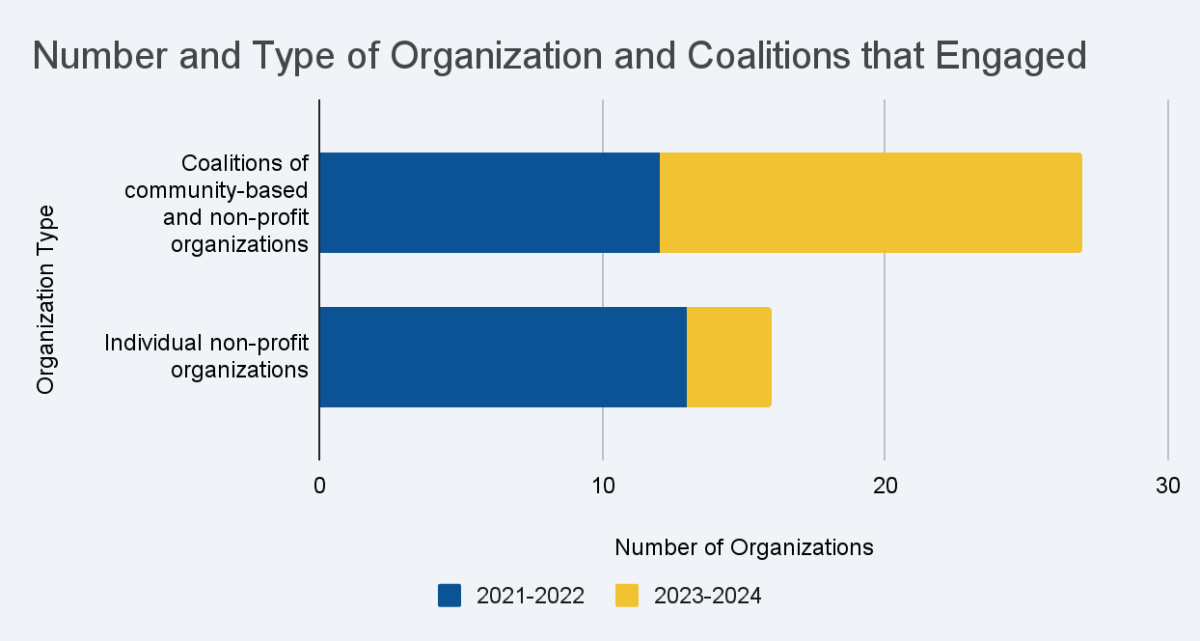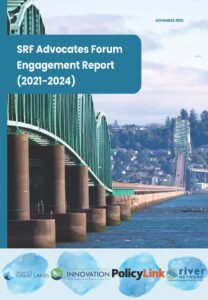The State Revolving Fund (SRF) Advocates Forum (Forum) brings together community leaders from more than 36 states advocating for critical water infrastructure funding needs to replace lead service lines, upgrade storm sewer systems that flood during storms, and more. SRFs are a significant funding source for local governments and utilities to pay for these critical water infrastructure projects. SRFs combine state and federal funds to support loan funding for projects (including some principal forgiveness), but each state administers its own program, resulting in varying priorities and rules for accessing financing and funding across states. The SRF Forum helps leaders navigate the patchwork of state SRF rules to make them more accessible, secure the needed funding, and ultimately provide clean and safe drinking water and necessary wastewater and stormwater services for their residents.
A newly released report authored by the Forum co-conveners – Alliance for Great Lakes, Environmental Policy Innovation Center, PolicyLink, and River Network – and with vital input from Forum members, documents Forum members’ advocacy journeys engaging with state staff across the country to focus SRF funding on communities with the highest need. The annual SRF Advocates Engagement Report highlights SRF Forum advocates’ successes, lessons learned, and strategic pivots to strengthen the broader movement for equitable water infrastructure funding. Through this report, we celebrate the advocates’ momentum while also highlighting the remaining urgent SRF program changes needed to support communities trying to access these funds.
What did we hear from advocates about their experiences with SRF programs in our SRF Engagement Survey and interviews with advocates?
Across two periods, 2021–2022 and 2023–2024, SRF Forum members:
- Emphasized the effectiveness of coordinated and coalition-based movements, leaning into shared capacity across several organizations to build relationships with state agencies to analyze and reform SRF policies. Most survey respondents (72%) stressed the importance of coalitions, with 63% of in-depth interview participants describing them as essential for sustaining advocacy efforts.

- Shared the SRF policy areas most important to their work, including:
- Helping small and otherwise vulnerable communities receive priority for principal forgiveness and other preferred loan terms. For example, advocates recommended increasing the total allocation of principal forgiveness available for communities in need, along with raising caps on the amount of principal forgiveness one community can receive toward a project.
- Providing technical assistance to make the SRFs more accessible for utilities serving low-income residents. For example, advocates focused on maximizing technical assistance funding to help state-defined disadvantaged communities advance projects to the Fundable List.
Why are the SRFs important to advocates?
The two federal SRF programs – the Clean Water SRF and the Drinking Water SRF – have provided more than $200 billion in financing for water infrastructure over the past several decades. When the Infrastructure Investment and Jobs Act (IIJA) was enacted in 2021, it infused an additional $43 billion into the SRF programs over five years (2022–2026). However, right now the U.S. Congress is considering changes to and reductions in the federal funding for these programs, making education about and advocacy around the SRFs more important than ever.
Over the past four years, the SRF Forum has developed a robust library of resources, learning sessions, and peer-led learning spaces. This report provides a snapshot of the extensive work and dedication of advocates supported by these tools, and experiences shared by their peers in the SRF Forum, to secure robust investment in our communities’ water resources. Going forward, members of the SRF Forum can continue to rely on these resources and community of practice to collectively keep advocating for federal and state investment in the SRFs during this critical time.
If you are interested in engaging with state SRF administrators on your state’s policies, we have resources for you! If you are an advocate interested in SRF policy reform, please join our community of practice. Become a member today.
To learn more about the SRF Advocates Forum, visit the website.

